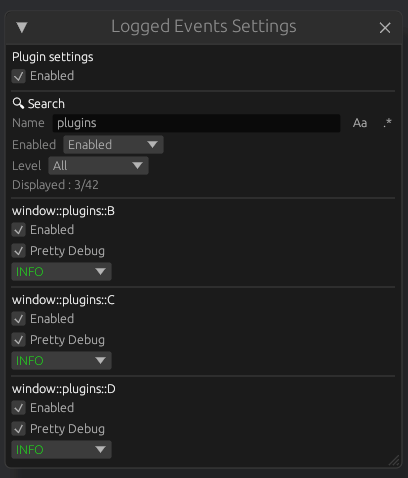7 releases (4 breaking)
Uses new Rust 2024
| new 0.5.0 | Apr 28, 2025 |
|---|---|
| 0.4.2 | Feb 4, 2025 |
| 0.4.1 | Dec 27, 2024 |
| 0.3.0 | Oct 25, 2024 |
| 0.1.0 | Oct 13, 2024 |
#514 in Game dev
525 downloads per month
58KB
754 lines
bevy_log_events
bevy_log_events is a Bevy plugin that introduce the LogEvent trait for Bevy's App. It will helps you log your Event while allowing you to configure independently how each events are logged even during program execution.
Features
- Easily log your events by adding a single line of code for each of them.
- You can configure independently how each events will be logged using the
LoggedEventSettings<E>resources. - Your settings are saved when you exit your application and reloaded the next time you launch it.
- You can use a window to edit the settings for all your logged events :

Usage
Add the crate to your Cargo.toml :
cargo add bevy_log_events
Then you just have to add the EguiPlugin and LogEventsPlugin plugin and use the functions from the LogEvent trait to log your events :
use std::time::Duration;
use bevy::{prelude::*, time::common_conditions::on_timer};
use bevy_egui::EguiPlugin;
use bevy_log_events::prelude::*;
// You must implement Debug for the events you want to log
#[derive(Event, Debug)]
struct MyEvent {
source: String,
}
fn main() {
App::new()
.add_plugins((
DefaultPlugins,
// You need to add the EguiPlugin before the LogEventsPlugin
EguiPlugin {
enable_multipass_for_primary_context: true,
},
// Add the logging plugin
LogEventsPlugin::new("assets/simple.ron"),
))
// You can now use add_and_log_event instead of add_event to add and log your events
.add_and_log_event::<MyEvent>()
// Triggered events can be log too with the use of observers
.log_triggered::<MyEvent>()
// Using log_event you can also log external events you did not add yourself
.log_event::<CursorEntered>()
.add_systems(
Update,
(
toggle_window,
(send_my_event, trigger_my_event).run_if(on_timer(Duration::from_secs(1))),
),
)
.run();
}
// MyEvent will be sent and logged every second at the end of each frame
fn send_my_event(mut events: EventWriter<MyEvent>) {
events.write(MyEvent {
source: "sent".into(),
});
}
// MyEvent will be triggered and logged every second during Update
fn trigger_my_event(mut commands: Commands) {
commands.trigger(MyEvent {
source: "triggered".into(),
});
}
// Toggle the editor window
fn toggle_window(
keyboard_input: Res<ButtonInput<KeyCode>>,
mut plugin_settings: ResMut<LogEventsPluginSettings>,
) {
if keyboard_input.just_pressed(KeyCode::Space) {
plugin_settings.show_window = !plugin_settings.show_window;
}
}
Examples
To run the minimal example from above :
cargo run --example simple
To run an example with more events and to see how to use the settings editor window :
cargo run --example window
To see a more complete example with triggered events check the copy of the official bevy example of observers :
cargo run --example observers
You can also try these examples by adding the bevy/track_location feature to see that the locations of send and trigger events are also logged.
Cargo Features
enabled
This feature if removed will entirely disable the LogEventsPlugin and the functions from the LogEvent trait to make them do nothing. No systems will be added, no resources will be inserted and no logging will occur.
To remove it you can setup your Cargo.toml as follow :
[features]
# Create a feature to state that the crate is enabled
dev = ["bevy_log_events/enabled"]
# You may want to set that feature as default
default = ["dev"]
[dependencies]
# Declare that you do not want default-features in your dependencies
bevy_log_events = { version = "0.5.0", default-features = false }
Then you can run your program as follow :
// If you do not set the feature dev as default do
cargo run --features dev
// Otherwise run your program without default features
cargo run --no-default-features
Note
Events registered with the use of log_event or add_and_log_event are all logged in the Last schedule inside the LogEventSet at the end of each frame. So keep in mind that these events will be logged with a delay and if many events of different types are sent in the same frame they may not be logged in the same order they were sent.
Bevy Versions Table
| bevy_log_events | bevy | bevy_egui |
|---|---|---|
| 0.5 | 0.16 | 0.34 |
| 0.4.2 | 0.15 | 0.32 |
| bevy_log_events | bevy | bevy_editor_pls |
|---|---|---|
| 0.3 | 0.14 | 0.9 - 0.10 |
| 0.2 | 0.14 | 0.9 - 0.10 |
| 0.1 | 0.13 | 0.8 |
Dependencies
~23–59MB
~1M SLoC